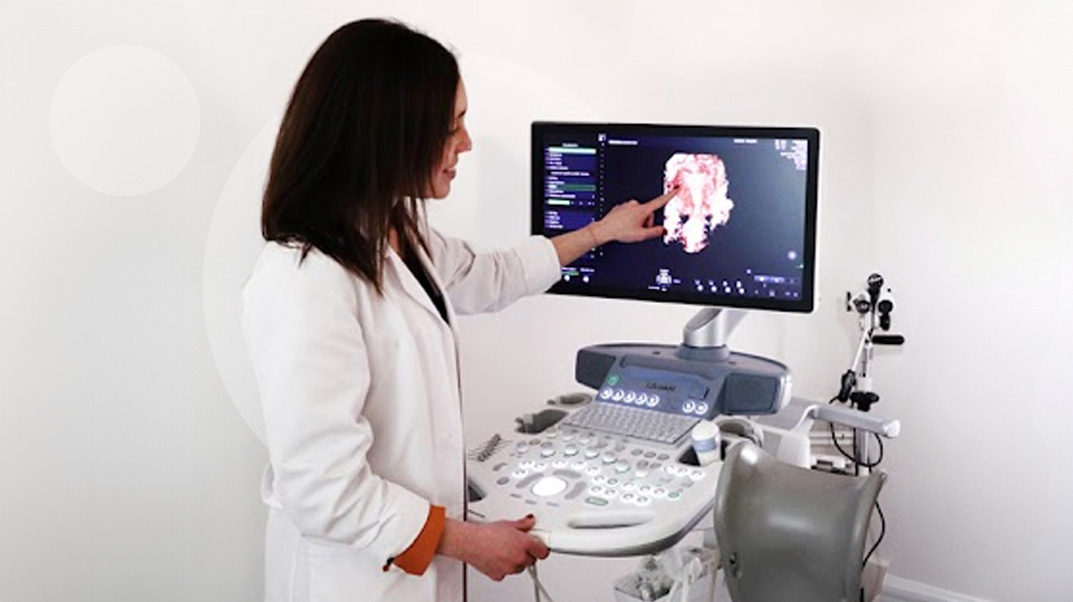Table of contents
Scientific study by Dr. Estefania Moreno on the implantation process in The Journal of Reproduction
Have you ever wondered how embryo implantation takes place? This small miracle of life is a process that requires a balance of many factors. One of the challenges in reproductive medicine is recurrent implantation failure (RIF), when the embryo fails to nest in the mother’s uterus or miscarries early. This article considers the crucial role of the endometrium and our research into it.
Advances in assisted reproduction
In the fascinating and often challenging world of assisted reproduction, every step forward is a triumph. This August, the scientific journal, The Journal of Reproduction highlighted one such achievement, publishing an article by Dr. Estefanía Moreno, Gynaecologist and fertility specialist at Clinica Tambre. This article affirms Tambre’s ongoing commitment to driving scientific research and development and belief that this offers our patients the best chance of success.
Dr. Moreno addresses one of the crucial issues in fertility: the role of the endometrium in embryo implantation. The endometrium is the inner layer of the uterus, the site of embryo implantation, a critical step for a successful pregnancy. Although it was long believed that only the quality of the embryo was important, we now know that a healthy and receptive endometrium is equally vital.
Imagine the endometrium as the soil in which a seed is planted. If the soil is not suitable, the seed, no matter how good it is, will not be able to grow into a plant. In the same way, even the strongest and healthiest embryo needs an endometrium in optimal condition to implant and develop. Dr Moreno’s research delves into how the health of the endometrium, together with immunological factors, and the precise synchronisation between the embryo and the uterus, are determining factors for success in fertility treatments such as in vitro fertilisation (IVF).
Implantation failures
One of the most fascinating aspects of the article is the focus on cases of recurrent implantation failure (RIF). A problem according to the Spanish Fertility Society (SEF), which affects between 10% and 15% of women undergoing fertility treatment. The fertility expert stresses that there is no universally accepted definition of RIF, which complicates both its diagnosis and treatment.
Endometrial thickness
The study also addresses endometrial thickness as a determinant of receptivity and implantation success. An endometrium considered “refractory” – i.e., less than 7mm thick on the day of ovulation or at the time of hCG administration – presents additional challenges for implantation. In these cases, Tambre offers innovative solutions such as platelet-rich plasma (PRP) therapy and the use of sildenafil, an experimental treatment that has shown benefits in increasing endometrial thickness and thus improving receptivity.
The role of endometrial microbiota and chronic endometritis
Another crucial aspect that Dr Moreno addresses in her article is the impact of endometrial microbiota and chronic endometritis on fertility treatment outcomes. The endometrium, like other parts of the body, harbours a community of microorganisms that play an essential role in reproductive health. An imbalance in this microbiota can lead to complications such as chronic endometritis, a silent inflammation that often goes unnoticed but can be responsible for implantation failure and recurrent miscarriages.
Research suggests that identification and appropriate treatment of these conditions can significantly improve success rates in assisted reproduction. However, Dr Moreno also highlights the need for further research, as there are still no validated diagnostic tests to confirm implantation failure mediated by immunological or microbiological factors.
Life-changing research
At Clinica Tambre we have witnessed how this research can change the lives of our patients. For example, we have had cases of women who, after several failed IVF attempts at other clinics, come to us discouraged and without hope. After performing a thorough analysis of their endometrium and adjusting the treatment according to their specific needs, we achieved what seemed impossible before: a successful pregnancy.
This personalised approach is what sets us apart. Not only do we seek to understand the biological aspects of each patient, but we also recognise the importance of emotional support at every stage of the process. We know that every story is unique, and we treat each case with the dedication and humanity it deserves.
The Tambre Foundation is the heart
But how did we reach these levels of excellence? The answer lies in the Tambre Foundation, the heart of our research work. It is here that we carry out innovative studies that allow us to be at the forefront of assisted reproduction. The Foundation is not only the place where new techniques are developed and existing treatments are perfected, but also a space that offers continuous training for our medical team and the dissemination of knowledge to the scientific community.
Thanks to the Tambre Foundation, we have been able to implement advances such as genetic evaluation of the endometrium and the study of the uterine microbiome, areas that are changing the way we approach cases of recurrent implantation failure. For example, recently, one of our studies identified imbalances in the endometrial microbiota that were preventing embryo implantation in several patients. After treating these imbalances, we were able to significantly improve pregnancy rates.
Tambre values
These advances reflect our core values: innovation, excellence, and a deeply human approach. Each patient is a person with dreams, fears and hopes. That is why at Tambre each treatment is tailor-made, taking into account both medical factors and the patient’s emotional wellbeing.
We are proud to say that we are specialists in difficult cases. Patients who have gone through multiple failed attempts at other clinics often find in Tambre a team that does not give up, that keeps investigating and searching for solutions until they find the right path for each person. This commitment translates into results that speak for themselves: high success rates, even in the most complex cases.
This publication is a reflection of the spirit of Clinica Tambre, where science and empathy, technology and humane treatment are combined to offer our patients the best possible care. We know that the road to motherhood can be arduous, but we are here to walk it with you, safe in the knowledge that research and continuous development are the keys that allow us to open new doors to success.
If you are looking for the most specialised support in assisted reproduction to fulfil your dream of becoming a mother, trust our team of experts. Don’t wait any longer, schedule your consultation and take the first step towards the family you’ve always wanted.


